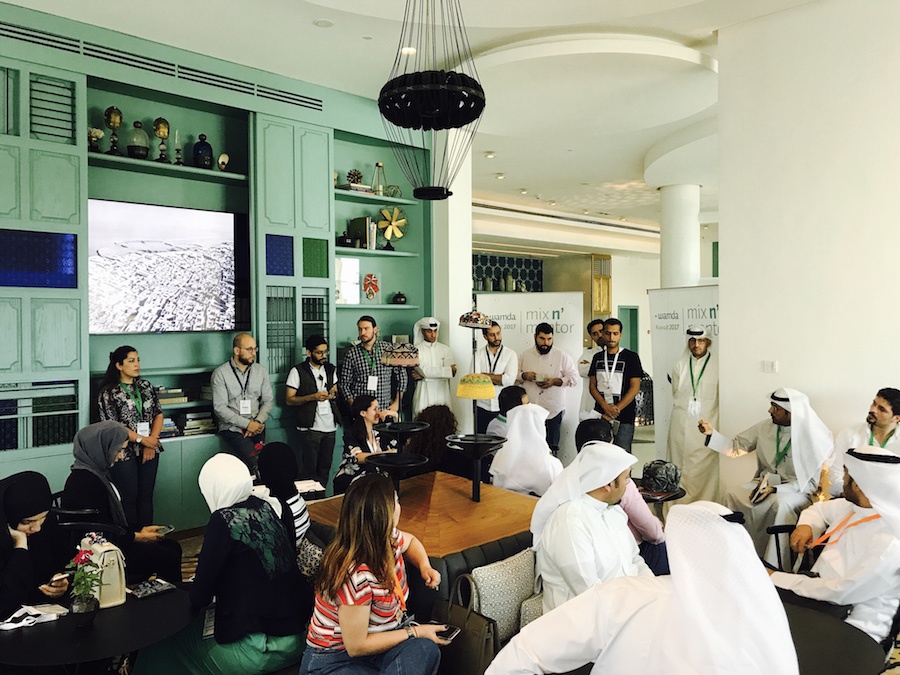Kuwait gets its own Community at #MixNMentor Nuwait

Faces old and new were at Kuwait City’s Dar Hamad venue on May 10, to attend the third Mix N’ Mentor Nuwait, hosted by The National Fund for SME Development and Wamda.
The main discussions on roundtables covered retaining social capital and what assessment tools entrepreneurs should use, investing in personal skills, building trust with big clients and pitching well.
A highlight of this year’s edition was the launch of Nuwait Community, a platform that connects entrepreneurs, supporting entities, investors and VCs in one place, to boost collaboration and give a voice to all players.
Users on the platform can request a connection, search for major players in the ecosystem, find jobs at startups and publish their own blog posts.
Here are our top takeaways from the day:
1- Make your social capital your real capital
Managing talent or social capital remains one tough nut to crack and was heavily discussed during the mentorship sessions.
Questions on this topic varied between how to hire a technical person if the employer doesn’t have a technical background, to what tools startups should use to assess competencies and how to set a budget for personnel growth.
Mariam Al-Douri, HR director at building materials company Acico Group, stressed the importance of using the ‘360’ and the ‘270’ degree feedback approaches, when assessing staff competencies. The first is when employees anonymously give feedback about their peers and the second is an appraisal conducted by the manager and the employee.
“It all comes down to what that person can deliver and what your standards are,” she added. “You also assess managers who are hiring and help them in doing so using key performance indicators (KPIs).”
On the other hand, Kuwaitnet CEO, Talal Al-Awadhi, gives new employees a grace period and dedicates an amount of money for each one for personal development.
He also believes that employers and entrepreneurs need to more self-development and improve their skills before seeking to hire, otherwise they might end up hiring people who are similar to them.

2- Build it and they’ll trust you
Building trust with potential clients and big corporations was a big challenge for startups at the event that haven’t proven their business model yet. Al-Awadhi advised them to develop a product or solution for them and give it for free. “After three to four products, we were asked for a meeting,” he said.
He also gave the example of Agility, the global logistics company based in Kuwait, that once promised the US army a huge warehouse for all their equipment even though they didn’t have a physical space then. “No need to have all the team and work ready and done from the beginning,” he said. “Have the idea and mission in place and respect the deadline you have given.”
3- Do the KISS
Anthony Gerrard, a chief executive at entrepreneurship training organisation Bad Idea, was giving a training session in the afternoon to six startups after they pitched to the Mix N’ Mentor audience, and teaching them how to master an elevator pitch.
He advised them to be brief, describe their idea in one simple sentence and move away from terminologies. “Keep it simple, stupid (KISS),” he said.

They also needed to clarify who their audience was, and the needs and the challenges they were facing. The pitching startups were all part of The National Fund’s ICT incubation program:
1- Technocare: an early-stage startup that aims to use wearables to cater to people with autism and special needs.
2- Labuna: an independent videogame developer.
3- Fanni: a marketplace for home service providers.
4- Karmasale: an online store selling sneakers and lifestyle products.
5- Viomedica: an ecommerce website for selling medical supplies and devices.
6- Etijaah: an online academy for entrepreneurs, featuring online video content in Arabic.
The session focused on how to answer questions that the audience may have had and removing all assumptions.
“Part of being an entrepreneur is doing the homework that others won’t do. Do a market study and answer your own questions,” said Rashid Sultan, partner at the recently opened food accelerator in Kuwait, Savour Ventures.


